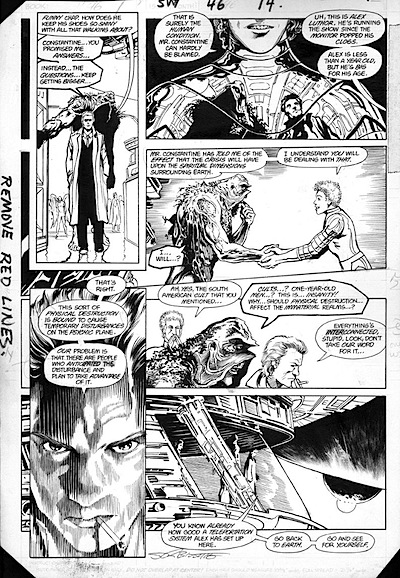By now everyone including the Hollywood trades has linked to Steve Bissette’s Facebook post about the Constantine TV show and the fact that he won’t get any money for the script currently being written:
As of this morning, it appears there will be NO payment to the Constantine creators for this series.
This option apparently rolled out of the already-paid-for option for the CONSTANTINE movie in the 1990s. Thus, we’ll only see $$ waaaay down the road, it appears, IF this series makes it to being a series. If it makes money. If it trickles down.
Will update you if/as we learn more.
But we will see $$ from any comics/graphic novels sold from the spillover of interest, FYI.
Hollywood accounting: gotta love it.
While this story fits comfortably within the familiar narrative of comics creators not getting paid for their work on characters later exploited in billion dollar movies…in this case, I don’t think the story is that simple and here’s why.
John Constantine the character debuted in Saga of the Swamp Thing #37, which was written by Alan Moore. Although the interior art was by Rick Veitch and John Totleben, Bissette and Totleben drew the cover and are credited with designing the character (who was based on the appearance of Sting, a musician popular at the time.) Moore, of course, long ago gave up any interest in option money for movies or TV based on his characters and signed royalties over to Bissette and Totleben for Constantine.
What’s a bit misleading about this headline is that it’s likely no one is getting paid residual rights for this TV show yet—ppartly because it isn’t a TV show yet. As Bissette stated, it’s part of the original option for the property. Without knowing all the details of this agreement and so on, TV deals don’t pay a lot of money upfront. Option money is often minuscule (four figures) and bigger bucks come down the pike. (Robert Kirkman is being paid as a producer on the Walking Dead TV show—I’d guess he’s getting a salary for that, but residuals take a loong time to roll out.) The Constantine TV show is just in the script stage now, so there isn’t anything to make money off of. More money kicks in at every stage — if a pilot is made there will be more money, if the pilot gets picked up, another payment, a DVD, more money and so on. PLUS, I’m told this kind of “character equity” money is paid out twice yearly—it isn’t a daily accounting.
What I think it’s important to point this out is that WB has been pretty good thus far about paying for the use of characters who have “character equity” deals. Creators have been paid for the use of characters in video games, live action and cartoons — I know people who got royalty checks for less than a dollar, but DC/WB still sends them out. It’s true that the “participation” rules have been changing in the new world order, but this is an area where DC has been pretty honorable up until now—you could argue that it should be more money, or more credit or whatever, but since we don’t know people’s bank accounts, and shouldn’t, it is speculation as of now.
I think Bissette’s transparency here is admirable, but even he points out that if it gets made into a series he will get paid some money. And he’ll profit in the shorter term from royalties on books—an area where everyone acknowledges DC has been an industry leader. (Ask creators about Marvel royalties and you’ll often get a very different answer.)
This “Bissette got no money” makes for a good headline, but it simplifies a complicated situation.
The Constantine situation in particular is even more complicated, as Andrew Wheeler points out:
That Bissette will only earn what he’s contractually obliged to is not very revelatory, but what’s interesting is that it’s not entirely clear who is affected by this arrangement. Alan Moore long ago ceased accepting compensation for adaptations of his work for DC. Rick Veitch and John Totleben may also have received compensation from the 2005 movie. Jamie Delano and Garth Ennis, who had influential runs on Hellblazer, were both credited for their contributions to the 2005 movie, possibly because characters they created were featured in the adaptation. Artist John Ridgway also worked on the Hellblazer series at launch, so there may be as many as six or more creators with a stake.
If Constanstine DOES go to series—and the way the deal is structured, if NBC passes on making a pilot, they will have to pay a hefty fee for the script—I would expect to see a LOT of little checks being cut for characters who appeared along the way. The Hellblazer saga is a shared universe in many, many ways.








“A musician popular at the time?”
Slightly, yes…
:)
Kirkman is an executive producer.
Frank Darabont was the developer.
When a series goes to syndication, that’s when the bucks pile up. Usually, a big chunk goes to the show’s creators. For TWD, who knows… probably Darabont and Kirkman get the biggest share, with smaller chunks to Moore and Adlard.
Dramas, and hour-long series, do not normally do well in syndication. In the modern era, you might see a cable network gaining exclusive rights (as with “Northern Exposure”), or most of the demand going to DVD collections or online downloads.
“Seinfeld” has made some $3.1 BILLION in repeat fees in the past 15 years. That’s about $400 Million to both Seinfeld and David. (And a nice chunk to WBE.) The actors get residuals (never-ending since 1970) and a share of DVD sales.
Generally, 80% of the rerun fees are retained by the production company. 20% is paid to actors and crew.
For Constantine, the big creatives are Daniel Cerone and David S. Goyer.
(And just imagine what Matt Groening is earning from The Simpsons! And will earn when the show ends, and the series can be sold to cable!)
On the upside, Sting is no longer popular.
Heidi seems to be the only one who actually understands how media rights deal work that’s written about this story. But I’d point out that the property isn’t optioned, it was SOLD. It was optioned at some point, but once production on the movie began, the option to purchase media rights was exercised. So it was a sale, not an option. An option gives the studio or production company an agreed upon term to get a movie into production, when that happens, they pay the rest of the media rights fees to the rights holder. And most of those deals give the new media rights holder (the studio or producer) the ability to set up tv series or sequel movies, and any additional fees owed to the whoever sold the rights get paid when those actually go into production.
Brubaker is nipping at Busiek’s heels for the title of Wisest Creator in a Comments Section.
No, I just tire of all these “creator X is getting screwed” stories sometimes, and this one is literally a non-story. DC doesn’t own the media rights to Constantine anymore, and as long as the current owner keeps exploiting them, thru sequels or tv series, they won’t revert. Fox couldn’t get a DD sequel done in time, so Marvel got the media rights back. Sony will always make sure there’s a Spiderman movie in production so that never happens to them.
At best, this is a deal where DC gave the other side an incredibly long term, but not too different from Fox developing a League of Extraordinary Gentleman tv series recently.
Ed’s got it exactly right in terms of sale vs option. I don’t think Steve understood this part of the deal dynamic before he pulled the trigger on this “creators get nothing” story.
Steve’s a zealous advocate for creator rights (and we need more of those) and there are lots of unfair situations that need publicity but he’s off base with this one. The Constantine deal, which gives the creators a 30% share of media rights, is a good one. In fact it should be celebrated as the model for IP profit sharing in the work-for-hire realm. Steve was integral to negotiating this deal in the mid-1980’s and DC has been fantastic keeping up their end of the paperwork and payments.
Kudos to Heidi for at least trying to get to the other side of the headline. I can only shake my head that none of the so called “news” sites that ran with this bothered to get in touch with the other parties involved for a balanced story.
Tom, Rich– how about getting back to being real reporters?
No…Warner and DC have NOT been pretty good about paying creators. A few favorite darlings, perhaps, not “pretty good” has certainly not been the experience across the broad expanse of freelancers screwed over by these corporations.
Must stop typing in anger when news sites are in the tank for DC. That should read…Outside of a few favorite darlings, “pretty good” has not been the experience across the broad expanse of freelancers screwed over by these corporations.
If Bissette ever gets money from the TV show, perhaps he could divert some of it to Sting, since it was clearly his face Bissette grafted onto the earliest version of John Constantine. I mean, it’s only fair, right?
Hi Tony,
I’m not sure I qualify as a “favorite darling” since I’ve had my ups and downs with editorial and management, but DC has been sending regular quarterly royalty statements and checks to me for over 28 years. I wish every comic book company I ever worked for had their track record on the back end.
Are you saying there are other freelancers not receiving their contracted royalties?
Yes. I’m one of them.
I’d like to know more. Can you give me a rundown or maybe a link to a site that explains the situation?
Comments are closed.